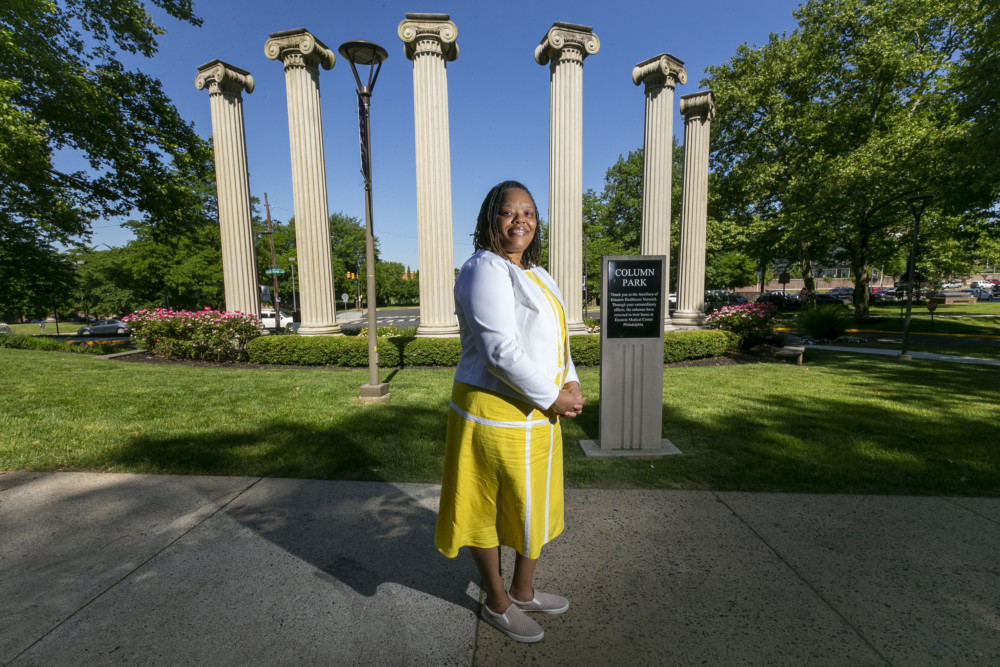By Stephanie Farr
The Philadelphia Inquirer
WWR Article Summary (tl;dr) Meet Robin Ross, a chaplain at Albert Einstein Medical Center in Philadelphia who works with COVID-19 patients.
Philadelphia
Even as the staff at Albert Einstein Medical Center faced their own shortages of personal protective equipment in the face of the coronavirus, they often offered their gear to Robin Ross and other chaplains at the hospital whenever they saw them approach a patient’s room.
“That short-changed them but they were willing to do it because the chaplain needed to give these patients and their families something they didn’t have in their arsenal to give them,” Ross said.
What Ross gives as a hospital chaplain, to believers and atheists alike, is the spiritual and emotional support the soul yearns for, especially when the body fails, or when it’s attacked by outside forces.
But despite years of working with everyone from cancer patients to gunshot victims, nothing prepared Ross for COVID-19, which not only attacks the body but, in an especially cruel twist, also isolates its victims during treatment and in death.
“A lot of people don’t understand why their loved ones aren’t there,” she said. “They’re so confused.”
And so, Ross, 49, of Northeast Philly, has become a lifeline for these patients, often holding up the phone or iPad as they video chat with their families.
“Sometimes it brings tears to my eyes when the patient is lying before me and they’re unable to communicate and the family is saying ‘We love you. Keep fighting. We’re praying,'” she said.
Ross didn’t want to do this, not at first any way. As someone in a high-risk category she initially scoffed at the idea of working during the pandemic.
But God had other plans, she said. Just like when she was a Philadelphia schoolteacher.
Ross grew up in Southwest Philly and attended St. Maria Goretti High School. While studying at St. Joseph’s University, she began attending a Baptist church in Bristol, where she lived with her husband and son at the time.
She prayed to God to lead her to her calling and hoped to find the answer in the Bible. One day, she was moved to read 1 Timothy 4:11-16, a passage which includes the line: “Until I come, devote yourself to the public reading of Scripture, to preaching and to teaching.”
“And then my heart was like ‘Oh my God! God is calling me to be a teacher!'” she said.
Ross taught at Christian and charter schools in Philadelphia, including four years teaching third grade in West Philly.
“I was not only the teacher, I was also a social worker, a nurse, and a mother,” she said. “I saw myself in their faces, their dreams, and their aspirations.”
But after seven years, Ross felt called to do something else. She went back to that same Bible verse she was led to all those years ago, but this time, she read it differently.
“I read it as PREACH and teach these things,” she said. “I thought ‘How come I never saw that before?'”
Ross, who was finishing her master’s in education, was “not trying to go to the seminary,” but she couldn’t shake the calling either.
“It made no sense to go to the seminary, but I just said yes,” she recalled.
Ross finished her master’s in education and the next month, enrolled at Palmer Theological Seminary. Since graduating in 2009, she’s done hospital and hospice work across the region and is currently an associate minister at Ebenezer Temple Pentecostal Church in Southwest Philly.
In 2017, Ross became a chaplain at Einstein, where she connects volunteer leaders of all faiths with patients of the same religion and also visits patients herself to offer emotional and spiritual support.
“It doesn’t matter what your faith is, or lack thereof, a chaplain will come and support you in what you believe,” she said.
When COVID-19 first hit the region, Ross was given the option to work from home and since she has asthma, she was set on doing so.
But then, she felt called by God to serve.
“I believe the Lord has me here for such times as this and I’m just going to trust and walk with him,” she said.
Ross has worked with more than 50 COVID-19 patients and their families, listening to their struggles and uniting them through technology. It’s been especially difficult for Ross, who is black, because the black community has been hit so hard.
“It goes back-to-back with a lot of the socio-economic ills that we deal with,” she said.
At the same time, many of those patients, and Ross herself, are watching as Black Lives Matter protests happen in Philadelphia and around the world in response to the killing of George Floyd by Minneapolis police.
“You have to provide grace, you have to provide mercy, but you have to speak out against injustices too,” she said. “It’s a lot of work during this time of COVID-19 and civil unrest, but it is a time for the chaplain because we help people process whatever is going on.”
___
Distributed by Tribune Content Agency, LLC.














































































































































































































































































































































































